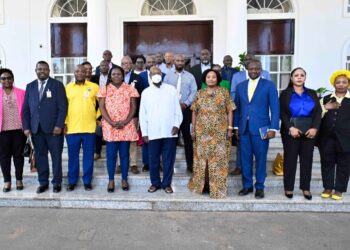By Waswa Tenywa
The Ministry of Health has spoken out on the circulating social media allegations that the Human Papillomavirus (HPV) vaccine for prevention of cervical cancer, is dangerous to the health of the population especially to the young girls and babies.
In a document released to the media on Wednesday, the Ministry of Health has re-assure the population that these allegations are false, unfounded and baseless, and would like to set the record straight as follows;
The HPV vaccine was first licenced for use in 2006 across the world. Studies conducted so far demonstrate that the vaccine is very safe and effective.
The World Health Organization (WHO) reports that rapid reductions of up to 90% in HPV infections and genital warts in teenage girls and young women were registered in Australia, New Zealand, Belgium, Germany, Sweden, the United Kingdom, and the United States.
It is therefore NOT true that the HPV vaccine was banned in most European countries. The vaccine is actually in use throughout the whole of Europe, the US and globally.
According to the document, In neighboring Rwanda, for example, the HPV vaccination achieved 93.23% coverage in 2011, protecting up to 98,792 girls within the target age bracket of 9-14 years. Rwanda’s incidence rate currently stands at approximately 42 cases per 100,000 women per year which is lower than many African nations.
Globally, Cancer of the cervix has a devastating effect on women’s health causing an estimated 466,000 new cases each year with 1.4 million women living with cancer of the cervix. It is the second commonest cancer amongst women but a leading cause of female cancer death with the vast majority of these women in developing countries.
The ministry says annually, Cervical cancer accounts for 40% of all cancers in Uganda while 1,800 new cases of the condition are registered. It is therefore against this background the Government of Uganda introduced the HPV Vaccine into the routine immunization schedule in 2015 in order to protect young girls aged 9-14 years from Cervical Cancer. The choice of this age bracket is based on assumption that girls of this age have not engaged in sexual activity as yet and therefore have not had exposure to Human Papillomavirus which is sexually transmitted. Vaccinating them is therefore protective.
The ministry says all vaccines introduced into the Routine Immunization schedule are pre-qualified and approved by the WHO following rigorous independent scientific review for safety and any adverse events following immunization. Research shows that the HPV vaccine is very safe and effective and boosts the body’s immunity against HPV infection thereby protecting a person from cervical and other HPV related cancers (oro-pharyngeal, vaginal and penile) as well as genital warts.
Do you have a story in your community or an opinion to share with us: Email us at editorial@watchdoguganda.com











